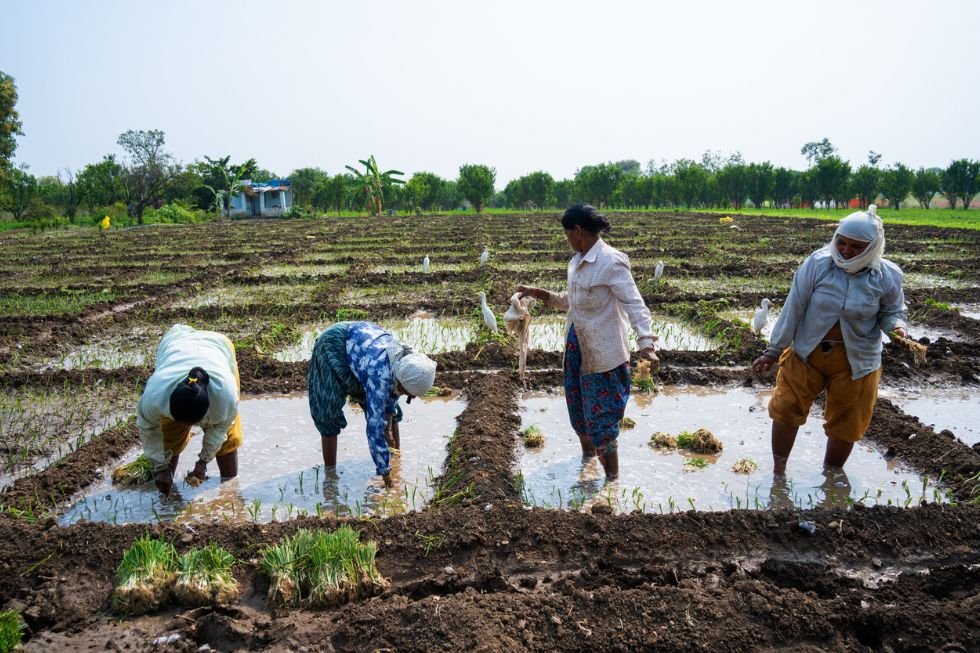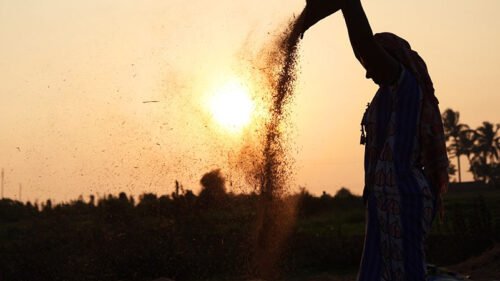The agriculture and allied sectors have seen their gross value added (GVA) more than triple between 2011-12 and 2023-24, as per a recent report by the Ministry of Statistics. Now, agriculture accounts for 16% of India’s GDP and remains the primary source of livelihood for nearly 46% of the population. Within agriculture, the demand for high-value crops, such as fruits and vegetables, and dairy products is rising rapidly at over 7–8% per year, compared to a slower growth rate of 3–4% per year for food grains.
Horticultural production has grown significantly, from 60 million tonnes in the 1980s to 368 million tonnes in crop year 2024–25, now accounting for 33% of the agricultural gross value added. Its multiple cropping cycles support the livelihoods of densely populated smallholder communities.
The dairy sector is experiencing rapid growth, presenting significant income-generating opportunities for resource-poor farmers. By rearing milch cattle, farmers can earn an income comparable to cultivating one acre of land. Moreover, dairy farming provides a regular daily income and creates employment opportunities, especially for women. However, being perishable, these crops and dairy products require additional post-harvest infrastructure, logistics and marketing support. This is possible only through farmers’ collectives. Farmers’ collectives are a method of agricultural production in which a group of farmers jointly own and manage their farms, operating them collectively as a single unit.
Farmers’ collectives: Cooperatives, Farmer Producer Companies (FPCs) and societies
In India, Cooperatives, Farmer Producer Companies (FPCs) and Societies represent three distinct forms of community-based organizations involved in collective economic and social activities, each with unique legal structures, governance and objectives.
A Cooperative is a democratic, member-owned institution formed under the State Cooperative Societies Act or the Multi-State Cooperative Societies Act, aiming for mutual economic benefit and governed by the principle of one member, one vote, often with significant government oversight.
An FPC is a hybrid model registered under the Companies Act, 2013, that combines the benefits of a cooperative structure with the efficiency of a corporate entity. It is limited to primary producers (such as farmers) as members and operates on a for-profit basis, with limited dividend and voting rights based on shareholding.
A Society, registered under the Societies Registration Act, 1860 (or respective state acts), is a non-profit organization formed by individuals united for charitable, educational, cultural or scientific purposes, governed by a managing committee, with no provision for profit distribution among members.
Since the 1950s, cooperatives have been the primary form of farmers’ collectives in India. However, their success has been limited due to structural challenges. Recently, with the establishment of a dedicated Ministry of Cooperation at the central level and the launch of targeted programs for Farmer Producer Organizations (FPOs), the role and relevance of farmers’ collectives are witnessing a renewed resurgence.
A FPO is a collective entity formed by groups of farmer-producers, registered under either Part IXA of the Companies Act or the Co-operative Societies Act of the respective states. These organizations are established with the primary objective of enhancing collective strength and achieving economies of scale in the production, processing and marketing of agricultural and allied sector products.
Now, the lives of 310 million people are supported by 843 thousand cooperatives spread across 30 sectors, including housing, dairy and agriculture. Farmers’ collectives such as AMUL, IFFCO, NAFED, KRIBHCO and Sahyadri Farms exemplify the strength and calibre of the farmers’ collectives in various forms and sizes. These success stories have become a beacon of hope, inspiring India’s 140 million farmers by offering models of success that can be replicated nationwide.
Since the Ministry of Cooperatives was established in 2021, the government has initiated approximately 60 key initiatives aimed at revitalizing the cooperative movement nationwide. Additionally, the United Nations has declared 2025 the International Year of Cooperatives, further strengthening the cooperative industry worldwide.
Farmers’ collectives require more governmental support amidst growing product demand
India’s fruit exports have increased significantly over the last five years. The export value went up by 47.5%, from $669 million in FY20 to $986 million in FY24. The volume of fruits exported also increased by 69%, from 755 thousand metric tons to 1276 thousand metric tons. India exports a wide variety of fresh fruits, including mangoes, grapes, bananas, apples, pineapples, pomegranates and watermelons, to more than 85 countries.
To cater to the growing global demand, farmers’ collectives have implemented various measures, including obtaining quality certifications, maintaining rigorous quality standards and strengthening their marketing strategies. These steps have enabled them to deliver high-quality produce with minimal pesticide residues, aligned with international market requirements.
As there is a global demand for Indian fruits and vegetables, governments should provide more support to these farmers’ collectives to meet this demand. Farmers’ collectives across India are making waves in global markets, signalling a new era for smallholder exports. While Amul is a 78-year-old cooperative, many other farmers’ collectives have also been functioning for years.
This article highlights selected success stories from various types of collectives, including cooperatives, farmer-producer companies and other organizational forms, to encourage farmers across India to replicate these models and benefit from them.
Amul: The world’s strongest food and dairy brand in 2024
Amul is a farmer-owned dairy cooperative established in 1946, operated by the Gujarat Cooperative Milk Marketing Federation (GCMMF). It is based in the state of Gujarat, India, located in the western part of the country. According to the Brand Finance ranking, Amul has been recognized as the world’s strongest food and dairy brand in 2024 and the third strongest brand in India in 2025.
Amul’s success is attributed to the collective efforts of over 3.6 million dairy farmers from 18,600 villages in the state of Gujarat. Amul collects more than 32 million litres of milk daily and delivers over 24 billion product packs annually. It has steadily expanded its presence to other states in India and foreign nations as well.
In the financial year 2025, Amul achieved a turnover of ₹65,911 crore ($7.75 billion) and generated revenue of ₹90,000 crore ($10.58 billion), thereby strengthening its position as an $11 billion cooperative entity.
Amul products are exported to over 50 countries. In 2024, the company entered the US market, followed by the Spanish market in 2025, marking its first step into the European Union. Now, Amul plans to enter the German, Italian and Swiss markets as well. Amul continues to strengthen its global brand while staying true to its cooperative roots. Supporting this broader vision, the upcoming Sardar Patel Co-operative Dairy Federation aims to unite two million dairy farmers from 20 states, scaling the cooperative movement at the national level.
IOFPCL: The first Organic Farmers Producer company in India
The Indian Organic Farmers Producer Company Limited (IOFPCL) is a unique, farmer-owned enterprise with its roots in Kerala, a southern state in India. IOFPCL is the first Organic Farmers Producer Company in India, established in September 2004 by a small collective of organic farmers.
Today, the company supports more than 2,500 primary producer members, helping them cultivate, certify and market their organic products to both domestic and international markets. The company specializes in high-quality organic spices, coffee and cocoa, and has built a strong reputation in global markets.
Over the years, IOFPCL has emerged as India’s largest organic producer company, with a strong footprint across Kerala, Karnataka and Tamil Nadu, and a distinct presence in the global organic market. The company exports rich cocoa to Switzerland and Germany, aromatic coffee to Germany and pure coconut oil to France. For the past 13 years, IOFPCL has been successfully exporting its products to Europe and America, contributing not only to farmers’ livelihoods but also to promoting India’s place in the global organic movement.
In 2021, IOFPCL recorded a turnover of ₹2.6 crore ($0.31 million), with a remarkable 60% of its revenue coming from international exports. This success story is not just about numbers — it’s about empowering farmers, promoting sustainable agriculture and showcasing India’s organic potential to the world.
Sahyadri Farms: India’s leading agri-tech house
Sahyadri Farmer Producer Company, based in Nashik (in Maharashtra, a western state of India), was founded by a visionary group of smallholder farmers led by Vilas Shinde in 2011. True to its spirit, the company operates for the farmers, by the farmers and of the farmers; empowering agricultural communities through collective strength and innovation.
What began as a cooperative effort has now evolved into India’s leading agri-tech powerhouse, championing sustainable and inclusive rural development. Over the past decade, the company has established a robust agri-tech ecosystem, empowering over 18,000 farmers across 252 villages and cultivating more than 30,000 acres of land.
Sahyadri’s fresh produce now reaches 110+ global customers in 42 countries. Sahyadri has emerged as India’s largest table grape exporter, contributing 17% of national exports, and has expanded into bananas, pomegranates and other fruits for global markets. Fuelled by innovation & collective effort, Sahyadri Farms achieved a remarkable 33% CAGR, growing its revenue from ₹458 crore ($55 million) in FY2020 to ₹1,924 crore ($232 million) in FY2025 — a strong testament to the global and sustainable scalability of farmer-led enterprises.
Biota Coorg: sustainable farming
Biota Coorg Farmer Producer Company Ltd, established in January 2020, is a growers’ collective based in Kodagu— India’s largest coffee-producing district (in Karnataka, a southern state of India). The company represents 122 small and medium-sized growers, providing services like aggregation, processing and marketing to enhance farmers’ incomes through value addition and exports.
About 50% of Biota’s member farms are Rainforest Alliance-certified, with the remaining farms in the certification process. Their coffee is also compliant with the European Union Deforestation Regulation (EUDR) standards. Biota currently exports to the USA, Canada, the UK, Italy, France, Germany and Portugal, and is exploring opportunities to export to Australia.
After exporting 80 tonnes of coffee last year, it now aims to exceed 100 tonnes this year. The company is also working on developing a brand that emphasizes Kodagu’s rich ecological and environmental heritage.
Odisha’s Emergence as an FPO Powerhouse
In 2024, three FPOs from Balangir (in Odisha, eastern state of India) exported 800 kg of vegetables to Dubai— first in the region— boosting farmer incomes by 25% with support from National Bank for Agriculture and Rural Development (NABARD). Price realization rose 30–40%.
In 2025, 1.7 tonnes of premium papaya from Dhenkanal were exported to London and Ireland, thanks to the support of the Agricultural and Processed Food Products Export Development Authority (APEDA), which empowered women and tribal farmers. Kandhamal turmeric now reaches the Netherlands.
UP’s Dussehri mango goes to the Middle East
Pratapgarh district (in Uttar Pradesh, northern state of India) has emerged as a key player on the global fruit market, with its renowned Dussehri and Chausa mangoes being exported to Dubai and Oman. Since the start of exports three years ago, demand for these aromatic and flavourful varieties has grown steadily, with shipments rising from 2 quintals in 2022 to 5 quintals in 2023. Farmers get returns up to 25% greater than those from local market sales.
A key factor driving this success is the use of fruit bagging technology, which shields mangoes from pests and weather-related damage, thereby improving both their appearance and shelf life. The government of Uttar Pradesh is also supporting this shift toward better practices. For the first time, two FPOs have independently exported mangoes, a historic milestone for the state’s growers.
FPOs from the northeastern states have also emerged as key players in agri exports. From vegetables, such as ginger and turmeric, to fruits and millets, FPOs are expanding into global markets, enhancing rural incomes and reshaping Indian agriculture.
These success stories herald a decisive shift, not just in agri-trade, but in how rural India is becoming a vital part of global value chains. With institutional support, quality produce and an entrepreneurial spirit, FPOs are proving that smallholder farmers can be big players on the world stage.
The importance of FPOs in declining land availability: Future implementation
India faces significant challenges, including the loss or waste of 40% of its produce annually, resulting in an economic loss of ₹92,651 crore ($11.16 billion). Additionally, 16% of fruits and vegetables spoil due to their limited shelf life and inadequate handling.
FPOs are vital today as cultivable land steadily shrinks, small and marginal farmers (86% of the total) work on plots under 2 ha and the farmland dropped from 159.6 million hectares in 2010‑11 to 141 million hectares in 2022-23.
By uniting dispersed smallholdings, FPOs help farmers achieve scale, access better inputs, credit and markets, and increase their bargaining power, making them a necessity in navigating fragmentation, rising costs and declining land availability. Additionally, by exporting fresh produce, farmers can earn better returns than they could through other means.
While these success stories may not be easily replicated across India due to its vast cultural, institutional and agro-ecological diversity, they offer adaptable models. With contextual adjustments, India’s 14 crore farmers can craft their own scalable, profitable and locally relevant solutions.
In line with this approach, the Ministry of Cooperation unveiled the National Cooperation Policy 2025 on July 24, replacing the 2002 policy and aligning with the vision of Viksit Bharat 2047. Targeting sectoral growth until 2045, the new policy aims to connect 50 crore people with cooperatives, with a focus on inclusivity for Dalits, Adivasis, women and youth. It envisions an expanded cooperative presence in sectors such as taxi services, insurance, tourism and green energy, to strengthen rural livelihoods and promote economic participation nationwide.
[Claudia Finak-Fournier edited this piece.]
The views expressed in this article are the author’s own and do not necessarily reflect Fair Observer’s editorial policy.
Support Fair Observer
We rely on your support for our independence, diversity and quality.
For more than 10 years, Fair Observer has been free, fair and independent. No billionaire owns us, no advertisers control us. We are a reader-supported nonprofit. Unlike many other publications, we keep our content free for readers regardless of where they live or whether they can afford to pay. We have no paywalls and no ads.
In the post-truth era of fake news, echo chambers and filter bubbles, we publish a plurality of perspectives from around the world. Anyone can publish with us, but everyone goes through a rigorous editorial process. So, you get fact-checked, well-reasoned content instead of noise.
We publish 3,000+ voices from 90+ countries. We also conduct education and training programs
on subjects ranging from digital media and journalism to writing and critical thinking. This
doesn’t come cheap. Servers, editors, trainers and web developers cost
money.
Please consider supporting us on a regular basis as a recurring donor or a
sustaining member.
Will you support FO’s journalism?
We rely on your support for our independence, diversity and quality.








Comment